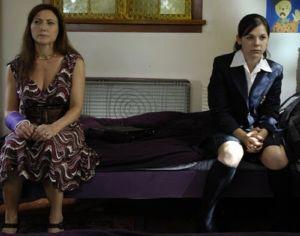Sheltered Life

Sheltered Life is a very confusing film to watch and to review. For the first hour or so, it’s brilliant. For the last ten or fifteen minutes, it’s absurd and rather disappointing. The acting ranges from the passable to the extraordinary as does the editing and cinematography. There isn’t much I can write without wanting to take it back a few sentences later, but be patient; I’ll try to find a point somewhere.
The film is set in a domestic violence shelter in Canada where a wealthy mother and daughter find themselves after the mother takes yet another beating from her husband. Immediately, the daughter takes refuge in a young woman and man, Kendra and Cal, who live there, and their fantasies of road trips spun in a broken down junker of a car in an open field. Their friendship, which seems more relief from boredom than true bonding at times, centers the film, and offers a running commentary on race, class, violence, injustice, and desperation.
The best parts of the film are extraordinary. Moments that would be graphic, loud, and filled with dramatic dialogue in most films of this ilk are silent, calm, and brilliantly understated. The visual disconnect of a rich, young, white girl with an SAT-worthy vocabulary and a prep school uniform wandering in the shelter’s dilapidated and barren surroundings provides a poignant challenge to the class-based stereotypes of domestic violence. The central characters’ awareness of their own small ironies and near obliviousness to their own horrors is very well done, both through decently written dialogue and some great acting, especially on the part of Jaren Brandt Bartlett and Eve Harlow (Cal and Kendra, respectively).
The worst parts are never truly horrific, just confusing, and a bit absurd. At times, the cinematography seems to jump styles from cinematic artistry to a plain, documentary-style harshness. This tendency doesn’t seem to have much of a point behind it—it's just there. While much of the film shows rather than tells the story of domestic violence and the complications of race and class, one scene delves into a rambling dialogue of after-school specialness that’s jarring to the senses. And finally, in what seems like a misguided and poorly composed attempt at a “feminist” ending, the film is ruined and many of the characteristics that made the first hour of the movie relatively engaging become completely inappropriate, stilted, and absurd.
I don’t think I’ve found a point yet to the film, or an overall recommendation, except perhaps this: if you watch the movie, cut it off after sixty or sixty-five minutes. You’ll have seen the best of it and can skip the worst. And if you get a chance, keep an eye out for Bartlett and Harlow. Those two would definitely be worth watching in a better vehicle than this one.
I should hope that viewers do not stop watching the film before the last ten minutes on your recommendation. The ending is beautiful and noteworthy. If it ended any other way it would be a cop-out.
To me, the true bad-guy in this film is not the bad dad, but violence itself. It's refreshing to be treated as an intelligent person by a film these days, which this film does.
Melinda, I would think you would be interested in supporting independent cinema like this movie instead of killing it with faint praise as you are. Too bad.
A film with guts and smarts like this one deserves more than the kind of brush-off you give it.